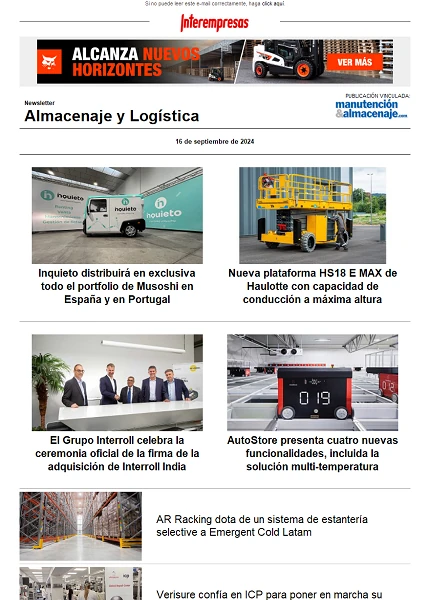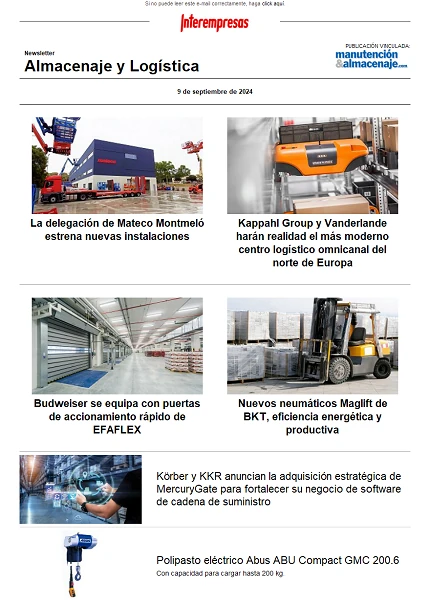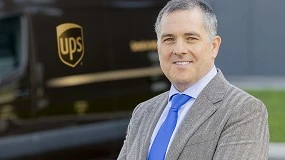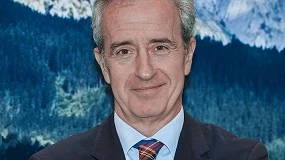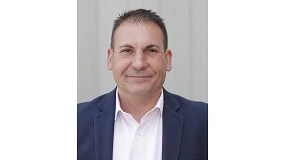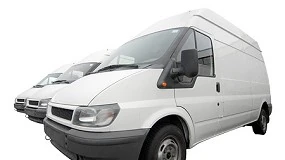Logistics enters the era of responsibility
February 20, 2009
The society calls for a balance between effective economic development model and a model of sustainability from the environmental and social point of view. The organizations are integrating into their strategies and policies these social demands in what are called programs of Corporate Social responsibility (CSR). Seeking a balance and strengthening mutual in relation to interest groups internal and external of the company between: economic development, social development and environmental sustainability. The logistics centres integrated in the Acte are no strangers to these new scenarios and are driving different environmental and social actions to improve its position in relation to the territory and the social environment where they are implanted. The days have allowed managers of logistic platforms enhance the implementation of comprehensive programmes of CSR.
Creating the 'new Logistics'
At the opening was attended by the President of Acte, Ramón Vázquez; the Mayor of El Prat de Llobregat, Lluís Tejedor; Ricard Frigola, Manager of economic promotion of the Barcelona City Council and Manel Nadal, Secretary of mobility of the Generalitat de Catalunya as well as President of Cimalsa. All participants welcomed this new initiative, above all by the social scope of topics covered, its continued relevance and general interest.
Ricard Frigola stressed the importance of the area of logistics activity of Barcelona, "the door logistics southern Europe" according to his words, composed of 4.5 million square meters of activity economic and located between two essential poles: el Prat Airport and the Port of Barcelona. For its part, Lluís Tejedor, Mayor of El Prat, one of the municipalities where is situated the Zal Barcelona, claimed that the logistics "are not only transport and trucks" and that these meetings were necessary to reflect on "essential, force, and general interest topics". Weaver also referred to the mixed nature of the logistics centers, often participated in part by the public sector and private, that social, environmental responsibility and employment should be for both sectors.
The Secretary of mobility of the Generalitat and President of Cimalsa, Manel Nadal, made reference to the economic crisis that is living as a good opportunity for the sector: "We are in the midst of the storm and as soon as we leave, some sectors will be more reinforced than others." Logistics will emerge strengthened from the crisis and will be a new logistics; "a new model that will emerge from initiatives such as these days".
Germán Granda, director-general of Forética, was the driver of the inaugural lecture of the day: ' the Corporate Social responsibility in the company today: CSR, of the management of the risk to innovation '. Forética is an Association of companies and professionals of the CSR which aims to promote the culture of ethical management and social responsibility by providing useful tools and knowledge organizations to successfully develop a competitive and sustainable business model. The Social responsibility of the organizations is the voluntary phenomenon than search reconciling growth and competitiveness, integrating at the same time the commitment to social development and the improvement of the environment. Granda referred to a few words from Barack Obama, "we're in the era of responsibility", to explain why more and more managers are sensitized with the problems of ethical, environmental and human rights. The growing concern by the society about these aspects is that companies should try to address them in depth, acquiring a permanent with all interest groups commitment. In addition companies see as increasingly better value companies that have such policies, thereby acquiring CSR commitments not only enhances the reputation of the company in the face of new consumers but that also helps the market access of investments that invest in ecological and responsible for capital.
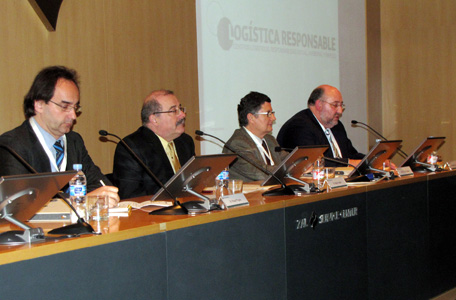
Territorial integration
Under the chairmanship of the director-general of Cimalsa, Ignasi Ragàs, table 1 was dedicated to territorial integration, landscape and sustainable construction in logistics. The rapporteur expert in this case was the architect Carles Llop, one of the editors of the 'book of style of the sectors of economic activity', of Incasòl, the Catalan Institute of soil, entity dependent of the Generalitat de Catalunya. In the European Parliament on ' the integration of industries in the territory. The industrial estates to the sectors of economic activity (Sae)', Llop emphasized that in the new action is required "upgrading the social perception of production spaces and overcome the old model of the industrial estate", using new criteria to ensure that the environmental quality of new sectors of economic activityto renew what were the industrial estates. Some sites are characterized by the geographic dispersion, wildly occupying land, by little actual sizes, the lack of culture of cooperation between neighbouring enterprises or insufficient or deficient service delivery. In contrast, the new Sae must have a large dimension, and to locate in places well communicated and strategically located in territorial infrastructure nodes, with good accessibility to public transport, and with the possibility of future enlargements; they should incorporate soil with good infrastructure and urbanized, with a good structure of use and functionality to allow for adaptability to the demands of industrial, tertiary, commercial and logistics business.
Experiences of sustainability
The experiences of this table 1 section, presented Logispark cases of Coperfil and ProLogis Zaragoza as examples of sustainable logistics buildings.
The presentation by Miquel Casas, head of the logistics area of Coperfil Real Estate, focused on the 'implementation of the programme European Green Building in the Logispark'.
Logispark aims to offer high added value business centres to facilitate the development of economic activities and contribute strongly to the economic and social development of the territory where they are located. Logispark Meco, located in Madrid, is also the first logistics industrial project with the Green Building label. This European programme is based on voluntary commitments, and its goal is to help to improve energy efficiency and introduce the use of renewable energy sources in buildings. In this sense, building Logispark Meco had the aim of achieving a minimum of 25 per cent of primary energy savings. This drew a plan of action to reduce the consumption of the new ship Meco R2, which proceeded to the installation of a larger surface of skylights and higher transmittance (polycarbonate instead of polyester type); the introduction of a system of lighting by photosensors control; and the photovoltaic installation on deck.
For its part, Gustavo Cardozo, Vice President for ProLogis Iberia gave the example of a ship of his company built in Zaragoza, seat of the Enterprise ARC, result of "the firm commitment of ProLogis to environment and sustainable development", in the words of Cardozo. This distribution center has been built using a wide variety of techniques for sustainable design, ProLogis has been introducing in their projects over the past few years, as part of its corporate commitment to minimize the environmental impact of their promotions and that customers will benefit from energy saving and consumption that offers a property of these features. Some of the environmental improvements include the installation of photovoltaic panels on the roof, a system of skylights strategically located to optimize the uptake of natural light in the warehouse, installation of artificial lighting for energy efficiency, solar water heaters, Park of transport systems ecological and catchment and rain water reuse systems. On the other hand, the structure of the roof is constructed with plywood elements and landscape design has been conceived with the idea of reducing the visual impact of the property, encourage the biodiversity of species in the enclosure and that it requires low maintenance and water consumption.
Optimization of natural resources
Already in table 2, 'Solar energy and resource saving', Mike Saur, Managing Director of NeslnBest presented the study on photovoltaic installations in centres of Acte. Conclusions be drawn from this study that the PV sector is characterized by a high level of regulation, with regulations from municipal up regulations EU directives and transaction processes are complex. Also, to the spectrum of covers, a photovoltaic plant should be adapted to each cover as a "tailored suit", in the words of Saur. The study also concluded that the solar irradiance in Andalusia is 50 percent higher than in the Bay of Biscay, but the photovoltaic electricity tariff is the same for all Spain, as far as to make viable the rental model and to equate the profitability of direct investment in the Northrequired additional subsidies, which may be regional, provincial or municipal.
With regard to the experiences presented in this second table of the day, Miguel Ángel Pérez, technical director of Plaza, platform logistics in Zaragoza, explained in his presentation 'The management of the water in Plaza' how since the platform is supplieddebugged it and it purifies again captured the Imperial Canal water.
On the other hand, Jesus Maria Arlabán, Director of CTPSA, city of the transport of Pamplona, agency Navarra logistics consultant and Vice-President of Acte, told the experience with the PV of the CTPSA. Arbalán highlighted the environmental liability in CTP since the start of your project, and the early attention to the possibilities of photovoltaic generation in the Centre. The facilities that are currently in operation are two decks of office buildings and four naves. However, Jesus Arbalán warned of the need to adjust costs and margins of investment because it can be to resent the profitability, something which would lead to a "halt to the expectations of growth in the sector of photovoltaic roofs".

Sustainable mobility
In the final table of the day, Rossend Bosch, Coordinator of the Bureau of mobility of the Llobregat Delta, unveiled the management of mobility of people in the logistics area. Daily occur a minimum of 65,100 travel of return in the logistics area of the Delta, and of these, only about 8,500 by public transport. The actions proposed by the mobility Plan of the area and that promotes the mobility Bureau of the Delta towards a more sustainable mobility is to promote the economic sustainability of the public transport to contribute to their financing; ensure the functional sustainability by integrating the new stations of subway (L9 and L10); and ensure the functional sustainability and the environment creating a network of pathways for pedestrians and bicycles.
'The dry port of Azuqueca de Henares as an example of intermodal long-distance freight transport' was the next presentation of the table, by Ramón Vázquez black, director of the Industrial area and logistics of the Greater Europe Group. Dry port has a 60,000 square meters private railway terminal with connections to seaports and direct access to General routes, without interfering with the operation of Renfe. After analyzing the external costs, both environmental and social, the study presented by Vazquez comes to the conclusion that the railway is the way of more sustainable transport and with less negative impact on society and the environment.
The meeting of the first day down the director-general of the unit of train of the Ferrocarrils of the Generalitat de Catalunya, Ramon Borrell, with the experience of the 'Autometro, rail transport in short distance'. Autometro society provides services of goods transport to rail or any other means of land transport follow-up, at the time serving as logistics operator and transport agency. The carriage of goods by rail not only reduces congestion in the road network (some 18,000 circulation of lorries by Autometro) and 32,000 by Cargometro but that also reduces oil consumption and emissions of polluting gases (60 tonnes of diesel and 206 tons of CO2 per year the Autometro and diesel 80 and 260) (tons of CO2 each year the Cargomentro).
Social responsibility
Santiago Bassols, CEO of Cilsa, was chaired by the second day dedicated to the 'Social responsibility and employment in the logistic centres'. Bassols, along with José Luis Rodríguez, director of Industrial Estate and area zone Franca customs the Consorci de the zone Franca de Barcelona, and Sagrario Huelin, head of CSR of Abertis, formed part of the opening panel of the dayheld on Friday, February 6.
Also, Sagrario Huelin was in charge of presenting the papers 'Abertis and its CSR strategy' in which explained how, for Abertis, CSR is a structural element and which already in the year 2003 was developed a CSR Strategic Planadopted in 2004, which established the priorities and, in a transversal manner, to affected areas and business units, from decision-making to the operational work. These actions range from the sustainable construction of buildings, to ensure transparency with the investment community, ensuring the motivation and involvement of human resources in the continuous improvement of the company, to extend the commitment to social responsibility to suppliers and subcontractorsto get involved with the community and in the social fabric, etc.
The ' Social responsibility: employment and training ' was the theme that focused the first table of the day, with the experiences of MRW, Manchalán and CETIM enterprises.
Paco Sosa, director of external relations of MRW, exposed the resources of social responsibility of your company, with policies such as the guarantee of the stability of employment, with zero rotation; flexible working day or telecommuting; professional support, training, internal promotion, low-end improvements and conciliation; support for the family, with actions such as the 'nursery 'ticket and free shipping; support for integration and equal opportunities, with the Fundosa Convention (10 per cent of disabled persons) and the best program; flexible facilities, such as gym, library, room entertainment, etc.
For its part, Ignacio Solano, CEO of Manchalán, focused his presentation on how his company has integrated occupationally disabled persons in the great Europe Cabanillas R2 Park. Manchalán has welcomed social Enclaves, a tool that serves to integrate people with disabilities in companies that are not within the protected employment. It's workers that are integrated within a work of a company that does not belong to the scope of protected employment, to develop the activities engaged in that enterprise, but that at all times depend on both organizational and hierarchically in the EEC, the special employment centre.
Finally the table 1, Miguel Martínez of Lizarrondo, CEO of CETIM, the Spanish Confederation of transport of goods, spoke on ' the professionalization through training. Challenges to the future. The role of the Administration, associations and companies ', focusing on the Petra II Plan carried out by your company.
Occupational and family conciliation
Already in table 2 of the second day, Jorge del Castillo, director-general of Clasa, explained that way his company faces 'La of the occupational risk prevention in the commitment to corporate social responsibility of Clasa'.
Presentations on the reconciliation of working life with family rushed to charge on the one hand of Sergi Lopez, executive director of the landmark project and Nuria Gilgado, Secretary of policies for women and equality FNTCM-UGT Catalonia.
Symphonie is a private initiative with a social vocation which aims to help companies and workers to reconcile work and family offering child education in the first cycle in business and/or business areas and solving the current problem of lack of capacity of child education and the difficulty of the parents of reconcile working life and the family, working hours and those of the nursery school. Landmark currently has three centres: Zal Barcelona, Mercabarna and Roquetes.
Nuria Gilgado of FNTCM-UGT, in his house on the reconciliation of work, personal and family life in the logistics companies, listed things to improve in the current corporate policies as the use of the language non-sexist in the assumption of family responsibilities; the promotion of the enjoyment by men of the shared maternity leave; relaxing days for male paternity leave; the policies of 'lights off' and on the prevention of the extension of working hours; and prevention of stress and time management training.
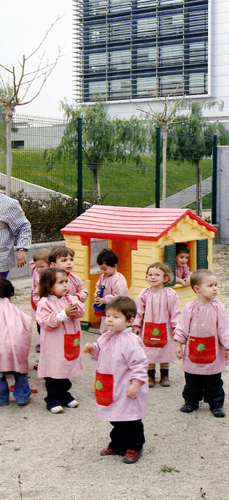
Impact of transport centres
Before we begin the third and final table of the Conference, was held the presentation of the study commissioned by Acte on the economic, social and environmental impact of transport on Spain centers. The charge to make it were Francisco Jimenez, director of logistics and transport and Jacinto Vaello, responsible for land and infrastructure, both from Arup Spain. According to the findings of this study, in the words of the rapporteurs, "it is necessary to provide criteria for rationalism and sustainability to the development of new centres of transport." "There is a need to create a competence rules for speed, flexibility and standardizing the development of transport centres and logistical platforms throughout the Spanish."
The regional project to the municipal
The paper ' transport centres: the logistics centers as instruments of development. Impact on municipalities ' focused on assessments, by different mayors and political representatives, of what it has meant to their localities having a transport Center or a logistics platform in their townships.
The outstanding presentation was provided by Montserrat Badia, agency public ports of Andalusia, from the 'Network areas Logistics' project. It's a planning document, accompanied by a special law, which considers the logistical areas as 'transport infrastructure'. This implies that, for the development of the new logistics areas, takes into account not only the issue of mobility, but also aspects relating to the environment, impact to climate change, etc.
And the plan integra, same concerning the logistical areas, across the road and railway network, existing or under development.
The 'network of logistics areas' aims to create important transport nodes for the area south of Spain, with performances as the Zal Bay of Algeciras, the expansion of the transportation center, the Logistics Park of Cordoba, the logistics centre of Bailén, etc.
"Most importantly develop planning is that, being from the own autonomous community, this is what determines the uses of these areas and, although at the urban level, they appear as logistical areas, its management works the same in the case of the port".
On the other hand, on the issue of sustainability, it should be noted that these areas established criteria as the introduction of renewable energies (e.g. photovoltaic plates), low energy consumption buildings, etc.
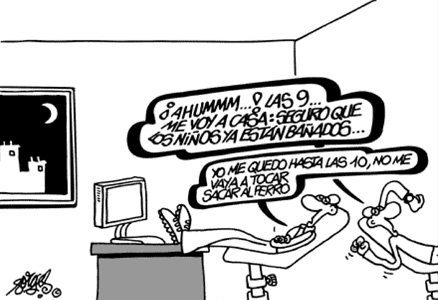
The experience of mayors
After his presentation, the presentation featured a round table attended by Manuel Lorenzo Blasco, Director of development and sports of the Government of Zaragoza; José Antonio Santano, Mayor of Irún; Manuel Ruiz, Mayor of Santa Perpètua de Mogoda (Barcelona); Saturnino Mañanes, Mayor of Benavente (Zamora); and Francisco Guisado, Mayor of Òdena (Barcelona).
Manuel Lorenzo Blasco presented, in turn, the macro that has proven to be square, the Zaragoza logistics platform. Situated in a particularly important strategic node, with 1,200 hectares of land, is situated next to the airport, very close to the fair, a railway platform, a second season of the bird and the future mega draft car park (with more than 1,700 square meters)It is a platform that clearly advocates total intermodality.
In the words of Blasco, "Plaza has made it possible to diversify the business, when only little Zaragoza basically depended on General Motors, which is very dangerous especially in economic times like the present". It also added that "it has also allowed relocate enterprises so far situated in the Centre of the city, both reporting a urban transformation as social" (more apartments and space for the city).
For its part, José Antonio Santano, Mayor de Irún, explained that this village, located in the corridor of Bayonne-San Sebastian, "is located on the French Hispanic frontier". In addition, I mentioned the fact that the disappearance of customs in 1993 (and the entry of the single market), meant to Irún a major economic shock from being the 'end' of the freight market to place at the Centre of a logistical corridor, "thanks to the creation of more than 1.5 million meters square, of which approximately half are related to transport". And all this with the creation of Zaisa, Irún transport centre, "a profitable economic society with a project for the future: take advantage of the railway with the entrance of the bird".
In the case of Santa Perpètua de Mogoda (Barcelona), its Mayor, Manuel Ruiz, placed special emphasis on a very specific data: it is a population with 14 industrial estates in their municipal term (four of them shared with other people) in a town of 25,000 inhabitants and about 14,000 people in transit. And, between all the polygons, highlighting the Cim Vallès, Cimalsa, pioneer in implant in the area. In this sense, admitted the Mayor that "was a project seen negatively in the beginning, so much the issue of pollution transport, increase traffic, etc., but that experience has shown us that, in reality, it has been a good thing for the municipality"", especially in terms of job creation".
His speaking time, Saturnino Mañanes, Mayor of Benavente, Zamora, Castile and León) explains which is for the community the integrated transportation Centre, with two ships of 20,000 square meters, which takes advantage of a historical and traditional step locationlocated next to a logistics park over a business centre which will open soon. In total, the project is about 50 hectares of new logistical ground.
Finally, Francisco Guisado, Mayor of Òdena (Barcelona), presented the current situation of the town: Òdena is a logistics project that is not yet a reality in the Township. "It is a potential reality which, with the exception of the A2 motorway, creates expectations but also frustration, because the proceedings too long". In the enclave where the rail link is a necessity, Òdena is located 1 hour from Barcelona and 4 or 5 of Madrid. For stew "it is necessary for those who are in the logistics sector to understand the problems in more rural areas to understand projects which might be very good in the city but it costs more in the less urban areas." In this sense, commented the Mayor that "when we want to convert a small population like Òdena in the 'polygon of Catalonia in Europe', this requires the assignment of a large amount of ground by the local administration that maybe should be redirected to the population", either as r & d centres, incubators of companies, services, etc. "." Also, Guisado added that sites who want to be logistical areas should have a more homogeneous design "Although it may be that certain economic activities have no place."
These conferences have been based on three main concepts:
- The sharing of 'best practices' already implemented in the field of logistics platforms or outside it.
- Transmit a knowledge updated in relation to the different social and environmental actions.
- Establish an open dialogue with public managers in the territory.

